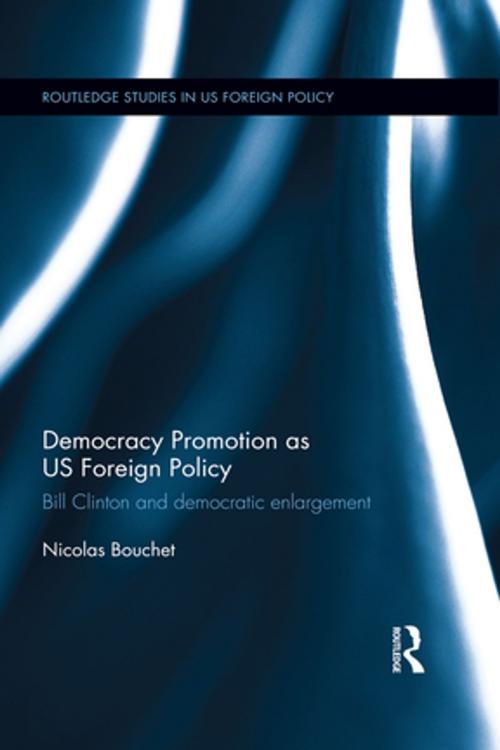Democracy Promotion as US Foreign Policy
Bill Clinton and Democratic Enlargement
Nonfiction, Social & Cultural Studies, Political Science, Government| Author: | Nicolas Bouchet | ISBN: | 9781135011161 |
| Publisher: | Taylor and Francis | Publication: | June 19, 2015 |
| Imprint: | Routledge | Language: | English |
| Author: | Nicolas Bouchet |
| ISBN: | 9781135011161 |
| Publisher: | Taylor and Francis |
| Publication: | June 19, 2015 |
| Imprint: | Routledge |
| Language: | English |
The role of democracy promotion in US foreign policy has increased considerably in the last three decades, booming especially in the immediate years after the end of the Cold War. The rise of democracy promotion originated in a long historical tradition that saw exporting American political values as instrumental in securing US security and economic interests, an idea which was expressed freely once Cold War strategic constraints disappeared. Under Bill Clinton, there was an explicit attempt to do so by reframing American strategy in terms of ‘democratic enlargement’ and this book assesses the strategic use of democracy promotion in US foreign policy and its different outcomes during his presidency.
Offering a comprehensive, global review of American democracy engagement with different regions of the world and key countries during a whole presidency, this book assesses how far the US has benefited from democracy promotion. It evaluates the instrumental value of democracy promotion for America by seeing whether the Clinton administration’s efforts in this field, and their varying impacts to democratization abroad, were matched by progress in securing US strategic goals defined under enlargement, in particular reducing international conflicts and spreading economic liberalization around the world. The book explores how democracy became central to US post-Cold War strategy, how the Clinton administration developed the concept of democratic enlargement and tried to implement it, and why it remained influential on foreign policy throughout Clinton’s presidency.
With an analysis of the legacy of Clinton’s democracy promotion and its relevance to the subsequent policies of George W. Bush and Barack Obama, this book is essential reading for students and scholars interested in Foreign Policy, American History and Security Studies.
The role of democracy promotion in US foreign policy has increased considerably in the last three decades, booming especially in the immediate years after the end of the Cold War. The rise of democracy promotion originated in a long historical tradition that saw exporting American political values as instrumental in securing US security and economic interests, an idea which was expressed freely once Cold War strategic constraints disappeared. Under Bill Clinton, there was an explicit attempt to do so by reframing American strategy in terms of ‘democratic enlargement’ and this book assesses the strategic use of democracy promotion in US foreign policy and its different outcomes during his presidency.
Offering a comprehensive, global review of American democracy engagement with different regions of the world and key countries during a whole presidency, this book assesses how far the US has benefited from democracy promotion. It evaluates the instrumental value of democracy promotion for America by seeing whether the Clinton administration’s efforts in this field, and their varying impacts to democratization abroad, were matched by progress in securing US strategic goals defined under enlargement, in particular reducing international conflicts and spreading economic liberalization around the world. The book explores how democracy became central to US post-Cold War strategy, how the Clinton administration developed the concept of democratic enlargement and tried to implement it, and why it remained influential on foreign policy throughout Clinton’s presidency.
With an analysis of the legacy of Clinton’s democracy promotion and its relevance to the subsequent policies of George W. Bush and Barack Obama, this book is essential reading for students and scholars interested in Foreign Policy, American History and Security Studies.















